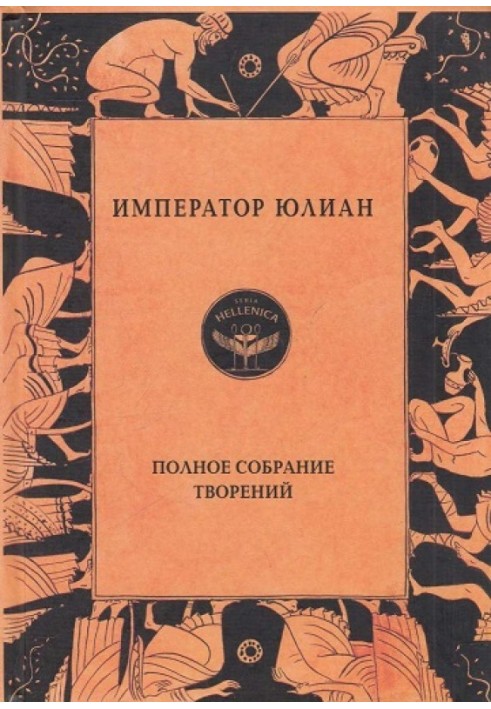Complete collection of creations
 Instant download
Instant download
after payment (24/7)
 Wide range of formats
Wide range of formats
(for all gadgets)
 Full book
Full book
(including for Apple and Android)
The work of Emperor Julian - a brilliant commander, a talented statesman, an excellent writer, an undoubted mystic and a theologian in love with Hellenic paganism - is one of the most significant events of the 4th century in the history of Europe. Everything in the life of this man was symbolic: he was the first of the Byzantine Emperors born in Constantinople, the nephew of Equal-to-the-Apostles Constantine and the husband of St. Elena; he died in Persia, competing with the deeds of Alexander, at the hands of a traitor. His life was like a song, and his death was like a parable. It is all the more surprising that he bequeathed to his descendants not only sagas about his exploits, but also a rather significant corpus of works, the complete collection of which the Russian reader now has the opportunity to become acquainted with for the first time. The book is equipped with extensive applications that introduce the reader to documents that help to understand Julian's work in the context of the era. For historians, religious scholars, philosophers, lovers of ancient literature. Contents: From the publisher 5 Literary and historical works of Caesar Julian's eulogy to the Autocrat Constantius (translated by L. I. Shchegoleva) 9 [Word] by Julian Caesar on the actions of the Autocrat and on the Kingdom (translated by L. I. Shchegoleva) 61 Julian Caesar by Eusevia. Laudatory Word to the Queen (trans. T. G. Sidasha) 125 Julian Caesar consolation for himself in connection with the departure of the most blessed Sallust (trans. T. G. Sidasha) 157 To Themistius the philosopher (trans. T. G. Sidasha) 73 To the Senate and people of Athens (trans. . T. G. Sidasha) 189 Cynic works Feast on Kronia (or Caesar) (trans. T. G. Sidasha) 213 To the ignorant Cynics (trans. T. G. Sidash) 249 Against Heraclius the Cynic (trans. T. G. Sidash) 277 Antiochians, or Bradonehater [Misopogon] (trans. T. G. Sidash) 317 Platonic works Against the Galileans (trans. A. B. Ranovich, T. G. Sidasha) 359 Letter on Worship of God (trans. T. G. Sidasha) 411 Hymn to the Mother of the Gods (trans. T. G. Sidasha) 431 To the Sun King (trans. T. G. Sidasha) 457 Letters 497 Appendices: Appendix 1. Isocrates. Evagoras (translated by T. G. Sidash) 635Appendix 2. Sallust. About the gods and the world (translated by R. B. Kochetkov and T. G. Sidash) 657Appendix 3. Julius Firmicus Maternus. On the fallacy of pagan beliefs (translated by A.V. Voitsekhovich) 679Appendix 4. M.A. Vedeshkin. Legal status of pagans and pagan cults in the Roman Empire in the 4th–6th centuries: legislation and practice. 749Appendix 5. Late Roman legislation on pagans, temples and sacrifices (translated by M. A. Vedeshkina) 792 Appendix 6. Church and Empire in legislative acts (from the beginning of the 4th century to the middle of the 5th century) (translated by Yu. G. Butaeva) 817 Appendix 7. Table of abbreviations of bibliographic sources mentioned in previous sections 899Appendix 8. Caesars, or emperors at a gala dinner with King Romulus, where are all the gods (translated by A. Urusova) 904Articles 933T. G. Sidash. Article for the first edition. Emperor Julian 935I. Life 935II. Philosophy of Julian 9451. Philosophy of Iamblichus and treatise of Plotinus II. 9452. Iamblichus and Julian 9573. Sun and Mother 9624. Helios - Apollo 969 Conclusion 972T. G. Sidash. Afterword to the 2nd edition. The Case of Emperor Julian 979 Introduction 9791. “The Fifth Gospel” of Catholic Christianity 9792. Middle Eastern ideology and social genesis of the Catholic Church 9943. Hellenism, Romanity, Imperialism 9974. Reunification of Christianity and Empire 999The Case of Emperor Julian 10021. Self-identification of Emperor Julian 10022. Julian as a pagan apologist. 10063. Julian as a denouncer of Christianity 10154. Emperor Julian as a High Priest 10185. Life as an act of veneration of icons 1021 Conclusion 1028 Apology of Judaism 1029 Apology of Christianity 1035 Appendix 1. Julian's political reform as the basis of political philosophy Synesius 1040 Appendix 2. How to read speculative theology Emperor Julian? 1050A. Theology of the Sun King 1050B. Theology of the Mother of the Gods 1057Appendix 3. Two “Imperial Catechisms” of the 4th century. 1062
Data sheet
- Name of the Author
- Флавий Клавдий Юлиан
- Language
- Russian
- Translator
- Коллектив авторов













